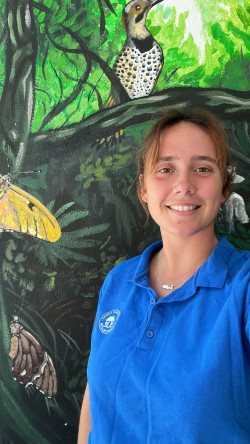News
The National Trust Moves Forward with Implementing Climate Education Grant

The National Trust for the Cayman Islands (NTCI) is the proud recipient of a grant from the Resilience, Sustainable Energy and Marine Biodiversity Programme (RESEMBID) that will fund the creation of a climate education pilot project in our local schools.
The European Union and Expertise France, the French International Technical Cooperation Agency, created this mechanism to support the Caribbean Overseas Countries and Territories (OCTs) in their efforts to build lasting solutions toward resilient, sustainable and productive societies.
This project aims to strengthen the resilience of the Cayman Islands through a standardised educational programme on climate science to help cope with the effects of climate change and promote the adoption of new sustainable practices.
The NTCI has hired Bella Rooney, a young Caymanian, for the position of Climate Education Officer to act as project manager for the grant. Ms. Rooney has been working in the climate and environmental space for the past few years, recently attending COP27 in Egypt as one of the National Trust’s Youth Representatives.
Bella has a BSc Honors in Zoology from the University of Exeter and experience in science communication through producing and running her environmental podcast: “Protecting Paradise” and previous work as Operations Manager for Plastic Free Cayman. "I feel incredibly privileged and excited to work on such a meaningful project for the Cayman Islands with the National Trust,” says Ms. Rooney. “Armouring the youth of our country with a contextual climate education feels like a massive step towards a sustainable future and safeguarding culture and nature here in Cayman."
In their visits to local classrooms, the National Trust noticed that education on climate science was uneven, varying greatly between schools. Every student should receive a basic understanding of this critical subject, therefore the Trust applied for funding to create a climate science curriculum that will be accessible to all.
The overarching aim of the project is to improve the capacity of the Cayman Islands to mitigate and adapt to climate change through improved understanding of the threat, as well as through the protection of intact natural areas (such as coral reefs and mangroves) and increased renewable energy use, leading to greater resilience as a society, as we face this existential threat.
The National Trust will work with both public and private primary and secondary schools in Grand Cayman and Cayman Brac to create their standardised curriculum on climate science. Activities will include classroom visits and the development of an e-learning platform that will provide engaging and instructive material focused on local issues.
Teachers and students will then be better equipped with information on the effects of climate change which will prepare our society for future challenges. The climate education pilot project will take place in seven schools in the Cayman Islands but will act as a model for other programmes throughout the region.












